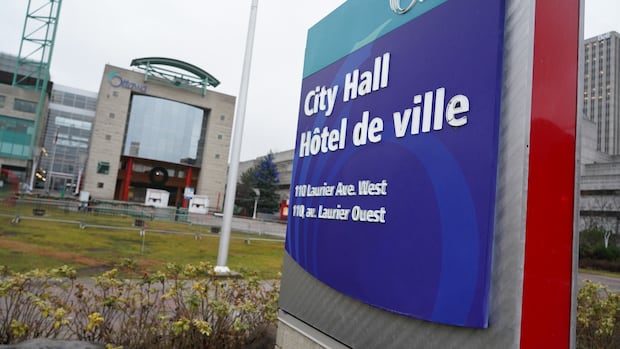Ottawa·NewOttawa will get its first look at the 2026 draft municipal budget on Wednesday, as city staff unveil a financial plan that’s expected to boost funding for police, tackle youth homelessness and try to keep OC Transpo from going off the fiscal rails.The 2026 draft budget could boost police funding by up to 6.5 per centListen to this articleEstimated 5 minutesThe audio version of this article is generated by text-to-speech, a technology based on artificial intelligence.Much of the 2026 city budget is pre-determined, with council setting an upper limit on tax hikes. (Francis Ferland/CBC)Ottawa will get its first look at the 2026 draft municipal budget on Wednesday, as city staff unveil a financial plan that’s expected to boost funding for police, tackle youth homelessness and try to keep OC Transpo from going off the fiscal rails.It will be the city’s last budget before next year’s municipal election. Mayor Mark Sutcliffe is scheduled to hold a news conference at 9 a.m., just before the document goes public.Much of the budget is already fixed, given pressures from inflation and collective agreements, as well as previous council decisions and long-term plans that dictate funding for water, sewage and garbage.Council has also set an upper limit on taxes, asking city staff to hold any increase to a maximum of 3.75 per cent overall. That’s enough to raise about $81 million in a budget worth about $5 billion. But the pie won’t be divided evenly. Council has asked for a budget that holds tax funding for most city services to a more modest hike of 2.9 per cent.OC Transpo and the Ottawa Police Service (OPS) each get their own dedicated slice of property taxes, and council has opened the door for higher increases. The specific numbers staff are recommending should become clear on Wednesday.The police levy could rise by as much as 6.5 per cent, as Mayor Mark Sutcliffe argues for a historic investment in public safety to get more officers on the streets. Council has left city staff with a menu of unpalatable options to fill a structural deficit at OC Transpo, which still hasn’t recovered from a deep dive in ridership that has left it starved for fare revenue ever since the pandemic.The draft budget could increase fares by somewhere between 2.5 and 7.5 per cent, or rely on efficiencies and deferred capital projects to save money. The transit share of property tax bills could rise by as little as three per cent, or as much as 15 per cent. If a similar exercise last year is any guide, the budget will mix and match those options to avoid dialing either taxes or fares up to the maximum level. Budget expected to follow through on homelessness pledgeThis fall, Sutcliffe promised to end youth homelessness within five years, and he has already signalled that the budget will include investments on that file.Kaite Burkholder Harris of the Alliance to End Homelessness said it’s clear the mayor is committed to the issues, and she expects the first stage of funding in the 2026 budget will flow to prevention initiatives.But that isn’t the only item on her wish list. She said the budget could tackle the toxic drug crisis at relatively low cost by investing in community supports, and she worries the budget will lean too heavily on police funding to stem the problem.“I worry that we are going down a more policing path to that component of community safety. So I would like the budget to show an investment and resourcing towards the community safety element that is actually about supporting people at that ground level,�” she said.“It doesn’t mean that police aren’t part of that work. They’re absolutely a part of the work. But ultimately, we need to really have service providers and police walking hand in hand to figure out how to support people most effectively.”In a 14-10 vote this fall, councillors asked city staff to hold the line on staffing as they prepare the 2026 budget. They voted for a cap on the total number of municipal staff, while making exceptions for areas like bylaw enforcement, paramedics, police and firefighters.If the draft budget hikes taxes by the 3.75 per cent ceiling set by council, it would mean about $166 extra on the average annual residential property tax bill.But that won’t be the only cost. Garbage fees are expected to increase by 10 per cent, or about $2 per month for the average single-family home, in keeping with a long-range financial plan and the city’s collection contracts.Rates for water, wastewater and stormwater also follow a ten-year plan calculated to keep up with the cost of maintaining and replacing infrastructure, like pipes, treatment plants and pump stations.Those rates are expected to go up by an average of 4.5 per cent in the 2026 budget. That would add up to roughly $50 per year for the average single-family home, though the specific sum would depend on usage.ABOUT THE AUTHORArthur White-Crummey is a reporter at CBC Ottawa. He has previously worked as a reporter in Saskatchewan covering the courts, city hall and the provincial legislature. You can reach him at arthur.white-crummey@cbc.ca.
Wednesday, 4 Mar 2026
Canada – The Illusion
Search
Have an existing account?
Sign In
© 2022 Foxiz News Network. Ruby Design Company. All Rights Reserved.
You May also Like
- More News:
- history
- Standing Bear Network
- John Gonzalez
- ᐊᔭᐦᑊ ayahp — It happened
- Creation
- Beneath the Water
- Olympic gold medal
- Jim Thorpe
- type O blood
- the bringer of life
- Raven
- Wás’agi
- NoiseCat
- 'Sugarcane'
- The rivers still sing
- ᑲᓂᐸᐏᐟ ᒪᐢᑿ
- ᐅᑳᐤ okâw — We remember
- ᐊᓂᓈᐯᐃᐧᐣ aninâpêwin — Truth
- This is what it means to be human.
- Nokoma











